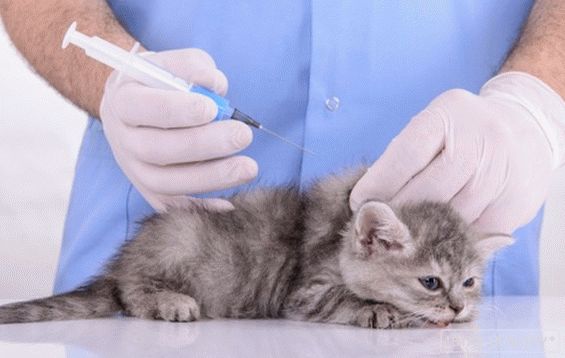 Вт, 28 ноя 2017 Автор: Юлия Александрова
Вт, 28 ноя 2017 Автор: Юлия Александрова
The risk of infection in young individuals is very high even with
little contact with the infection. They also transmit diseases
heavier than stronger animals. To protect the pet from serious
diseases, while minimizing the risk of complications, it is important
find out what vaccinations do kittens and remember the rules, without
observance of which vaccination can bring not benefit, but harm.
Contents
What vaccinations do kittens
There are many infectious diseases that
prone to cats, to protect the animal from all impossible. Schedule
vaccination was developed by experts on the basis of
probability and danger of disease. Viruses, strains were identified
which must be included in the vaccine at the first vaccination
kitten:
1. Calicivirosis.
Symptoms:
– increase in body temperature;
– discharge from the eyes and nose;
– excessive salivation;
– sneezing;
– weakness;
– weight loss;
– ulcers on the tongue and hard palate;
– horomot.
Method of infection:
– by direct contact with a sick animal;
– airborne droplets;
– through hands, shoes and any objects;
– in utero from cat to kittens.
Forecast: average duration: 1-3 weeks. Lethality – more
thirty%. The risk of addition of other viruses and bacteria is high, mortality
in this case exceeds 80%.
2. Rinotracheitis.
Symptoms:
– increase in body temperature;
– Abundant purulent discharge from the eyes and nose;
– cough, hoarseness;
– accumulation of pus in the pharynx, causing vomiting;
– ulcers on the upper part of the tongue;
– salivation;
– swelling and inflammation of the mucous membranes;
– breathing with open mouth.
Method of infection:
– by direct contact with an infected animal, which
may save the virus for up to 9 months after healing or even be
latent carrier;
– airborne droplets;
– through hands, shoes and any items.
Forecast: mortality up to 20%. Possible complication of bronchitis and
pneumonia, central nervous system disorder, and
ulcers on the skin. The disease can become chronic. Have
pregnant cats have a high risk of giving birth to a dead offspring.
3. Panleukopenia (“cat distemper”)
Symptoms:
– A significant deterioration in the general condition;
– a sharp increase in temperature;
– vomiting;
– diarrhea, often mixed with blood;
– weight loss.
Method of infection:
– contact with sick or ill animals;
– through fleas or other blood-sucking insects;
– in utero from cat to kittens.
Prognosis: acute form lasts 1-10 days. With hyperacute
sudden death of the animal is possible. Mortality among kittens – to
90%.
4. Chlamydia
Symptoms:
– increase in body temperature;
– tearing, turning into purulent discharge from the eyes;
– redness of the eyes;
– violations in the gastrointestinal tract;
– runny nose, sneezing.
Method of infection:
– upon contact with a sick animal or its secretions;
– airborne droplets;
– in utero from cat to kittens.
Prognosis: May become chronic. maybe
immunocompromised human infection.
5. Rabies
Symptoms:
– change in behavior (lethargy / aggression);
– frequent atypically loud meow;
– convulsions and paralysis;
– loss of appetite.
Manifestations depend on the form of the disease!
Method of infection:
– bite of a sick animal;
– without bite: if saliva from an infected individual gets on
damaged mucous membranes and skin;
– eating a sick animal (rats, etc.).
Forecast: 100% mortality. There is no cure
animal must be put to sleep.
Also sometimes do vaccinations against infectious peritonitis (with 4
months), trichophytosis and microsporia.
All of these infections, like many others, not even dangerous
for adult animals, can cause the death of the young individual
or cause abnormal development and pathologies in
the future. Therefore, it is imperative to vaccinate a kitten from them.
At what age should a kitten be vaccinated?
Experts recommend starting vaccination with 2-3 months. Through
23 days after the first vaccination, the kitten must be held
revaccination – reintroduce the same vaccine. Vaccination by
madness does not require revaccination and is carried out simultaneously or with
the introduction of a comprehensive vaccine for the first time, or during
revaccination.
Subsequently, vaccination should be carried out once a year throughout
pet’s life.
When it is necessary to postpone the first vaccination kitten
Consider, in which cases it is impossible even to vaccinate a kitten
when they reach the required age:
– the presence of worms, fleas, ticks;
– increased body temperature;
– discharge from the eyes, nose;
– diarrhea and other disorders of the gastrointestinal tract;
– itching in the ears;
– recent contact with sick animals;
– treatment with antibiotics and 2 weeks after the end of treatment;
– the postoperative and rehabilitation period.
If any other signs of malaise are detected, vaccination
It is also worth to postpone, only a healthy animal can be vaccinated.
Vaccination rules
To prevent vaccination from harming a young, fragile organism,
You must follow the rules:
1. Do not break terms of vaccination and revaccination;
2. Use approved vaccines;
3. Ensure that the terms and conditions of storage are not violated.
vaccine injected;
4. 10 days before the first vaccination, it is imperative to hold
degelmentization – treatment-and-prophylactic measures for
ridding the kitten of worms. During this time it is important
carefully observe the feces of the animal. If in them
parasites are detected, then after 10 days you need to re-give
animal anthelmintic (similar or other). If at
visual inspection of parasites was not found, you can do
inoculation.
5. Do not plan operations for the post-vaccination period (at least
three weeks, better more). Only emergency operational is permissible.
intervention, without which it is impossible to do.
6. Avoid stress during the week before and after vaccination.
7. For the first vaccination is better to invite a specialist at home,
to avoid contamination of a pet in a veterinary clinic.
8. Vaccination should be done as gently as possible so as not to
scare the animal and not cause stress.
Vaccine complications
Even with vaccination by a qualified specialist with
compliance with all necessary rules, the animal is not insured from
developmental complications. Among the possible problems are the most
common – allergic reactions. They may manifest as
excessive salivation and tearing, fever,
swelling, indigestion, redness of the injection site, deterioration
general condition. The most dangerous allergic reactions most often.
detected in the first minutes after the injection. Therefore it is better if
after drug administration, veterinarian for about 15 minutes
monitors the condition of the animal, so that at danger
take action immediately. If a pet has an allergy,
you need to remember the name of the vaccine and the next time
use its counterpart. In this case, not always deterioration
condition of the animal after vaccination suggests that the drug
does not suit him. If the manifestations are within the norm, then their
can be considered the natural response of an organism struggling with
infection and producing immunity. In each case
better to consult a veterinarian.
Having figured out at what age and which vaccinations to do
kitten, breeder gets the opportunity to protect your pet from
many unnecessary problems. Dispel any doubts about
whether a specific animal can be vaccinated, as well as help
distinguishing complications from a normal reaction to a vaccine will help
competent specialist.






